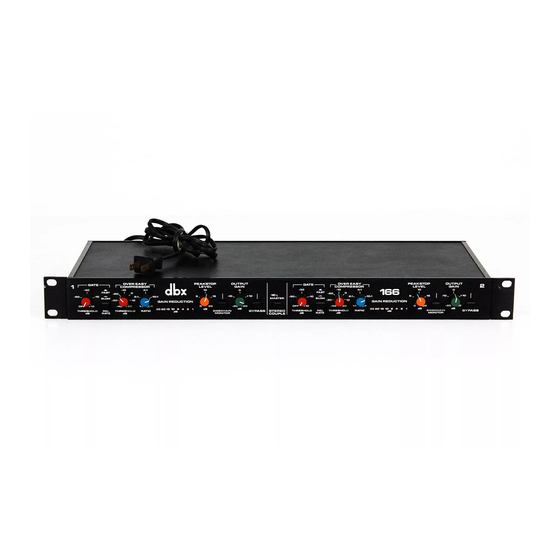dbx 166 Schnellstart-Handbuch - Seite 4
Blättern Sie online oder laden Sie pdf Schnellstart-Handbuch für Aufnahmegeräte dbx 166 herunter. dbx 166 18 Seiten. Professional dynamics processor
Auch für dbx 166: Kurzanleitung (17 seiten)

REAR,
Channel
2
(1
is
identical)
f
dbx'
'
1
'-©
^
©
©--i
©
©-t
m
^jf
m
r3E
O
1
1
|l!l
lilli
:
1
)
(
2
)
1
AUDIOilN,
OUT.
These
two
S^arcuit
phone
jacks are the Input
and Output. As
marked,
these
jacks are the
standard
tip/plus,
ring/minus,
and
sieeve/ground.
2
SIDECHAIN;IN.
This jack provides
a
direct input (optional) to
the rms-detector
circuitry.
It
is
used
for
connecting a
signal
processor
for
altermg
the
dynamic
response of the
166.
An example
would be an
equalizer
to
make
the
compression
or
the gating frequency-sensitive
(see
Sidechain Monitor, below). This
input uses
a
2-circuit
phone
jack:
tip
is
plus,
sleeve ground.
FRONT,
Channel
1
(2
is
identical)
3
GATE:THRESHOLD
and
RELease RATErFAST,
SLOW.
The
1
66 gate
is
a below-
threshold attenuator
with
two
release
rates.
The
Threshold
kr>ob
sets the level
below which
the
1
66 gates
~
attenuates
—
the
signal.
The
LED
lights
whenever
this
takes
place.
As marked,
the threshold ranges
from +10
to
below
-60 dB; Off, of
course, inactivates the gate.
The
amount
of
attenuation
is
set at
40 dB.
The
RELease
RATE
switch controls
how
fast
the
signal
gets attenuated.
In
the
Slow
position
(in),
the
rate
is
useful for
general-purpose gating of noise behind
vocals
and
acoustic instruments
—
about
1
0 dB/s.
In
the Fast
position,
the
rate
is
very
fast
(1000
dB/s), useful for tightening
up
the
sound
of percussion
(e.g.,
kick or
snare
drum) and
drying
up leakage from
other instruments
into
percussion
tracks.
The
attack
rate of
the gate (which controls
how
fast
the
signal
is
restored after
being attenuated)
is
internally set
to
be
very
fast
—
fast
enough
to
edlow
all
of the
transient at the
beginning of a note
to
come
through.
4
OVEREASY COMPRESSOR:THRESHOLD
and
RATIO.
The
Threshold
knob
sets the
point at
which
dbx's
well-known Over-
Easy
circuit
begins
to
compress
the
dyna-
mic
remge
of
the
signal.
The
calibration
numbers
refer to
the middle of the
Over-
Easy curve
(see
right);
at
an
Infinity:!
ratio,
they
denote
the point
where
there's
approximately
6
dB
of
compression.
The
OverEasy
sound
is
musical and unobtru-
sive,
without the "held-back"
feeling of
other compressors.
- 2
-
Input
